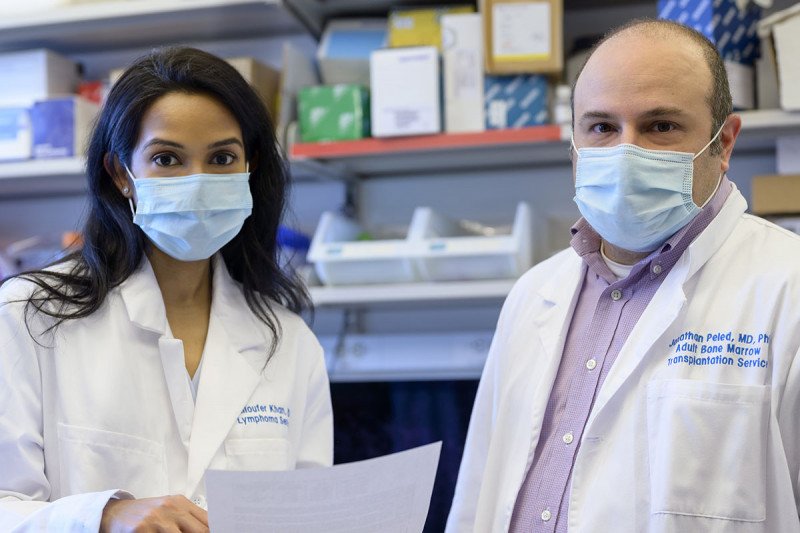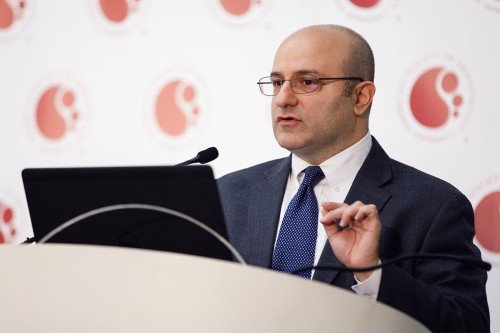
Medical oncologists Niloufer Khan and Jonathan Peled are studying how bone marrow transplants affect the microbiota in the gut.
A patient’s health after a stem cell or bone marrow transplant (BMT) can depend on the bacteria in their gut. The trillions of microorganisms living there are also known as the microbiota. They can be damaged or wiped out by cancer treatments, leaving patients with severe intestinal problems.
Investigators at Memorial Sloan Kettering are leaders in studying and improving how patients fare after having these transplants.
So far, their work has focused on people who have transplants using cells from a donor — known as allogeneic BMTs. In February 2020, MSK researchers published a paper in the New England Journal of Medicine showing that people who had an allogeneic transplant had a lower risk of dying if they had a greater diversity of species in their intestinal microbiota.
Now, a team led by researchers from MSK has published the first large study of how the microbiota influences outcomes in people using their own cells — known as autologous BMTs. Their findings are similar to what they saw in allogeneic BMTs: Having a healthy microbiota before starting the transplant process is important for having a successful transplant and leads to fewer complications after the procedure. The findings were published March 18, 2021, in the journal Blood.
“We undertook this project knowing that patients undergoing autologous transplants have had disruptions to their microbiota,” says first author Niloufer Khan, a medical oncologist at MSK who specializes in caring for people with lymphoma. “Like people who have allogeneic BMTs, people who have autologous transplants also have a microbiota that has been disturbed by previous cancer treatment. We hypothesized that this might influence clinical outcomes.”
Diversity of Microbes Improves Outcomes
The researchers found that diversity in the microbiota was crucial. Patients with fewer species of microbes had a higher risk of having their disease get worse as well as a higher risk of dying.
The study included data from 534 people who were given BMTs using their own cells. Autologous transplants are most often used to treat patients with multiple myeloma, amyloidosis, and certain types of lymphoma. (Donor transplants typically are used for different blood cancers, including leukemia, myelodysplastic syndrome, and other kinds of lymphoma.)
In addition to information about what drugs the patients received and how they did after their transplants, the data also included 1,161 fecal samples that were collected from those patients before and after their transplants. The fecal samples were analyzed to determine the makeup of the microbes in the gastrointestinal tract.
These results demonstrate the importance of protecting the microbiota.
Keeping the Microbiota Healthy
This study was possible thanks to a research grant from The Society of MSK.
When a patient is diagnosed with any blood cancer, a BMT is rarely the first course of treatment. Instead, they first receive months or years of chemotherapy to try to destroy their cancer, and these drugs can affect their microbiota. Plus, chemotherapy affects what people eat by changing their sense of taste and smell. This also has a big influence on the microorganisms that live in the gut, changing the overall balance and makeup.
By the time patients get to the point in their treatment where they need a BMT, the microbiota in their guts is often already badly disrupted. The types of microbiota that help to ensure a healthy gastrointestinal tract may be completely wiped out while other potentially dangerous strains may be widespread.
Using Fewer Antibiotics
Antibiotics used to prevent infections during the transplant process can further harm beneficial bacteria and allow dangerous strains to take over. MSK researchers are studying how this happens so they can develop treatments that protect the microbiota.
“An active question in the field is whether we can protect the microbiota simply by using fewer antibiotics,” says physician-scientist Jonathan Peled, one of the paper’s senior authors. Together with physician-scientist Marcel van den Brink, Dr. Peled has studied the influence of the microbiota on the outcome of transplants for many years.
Findings Guide Future Research
This is something the investigators plan to study as a way to keep the microbiota healthy throughout cancer treatment, including during the transplant process. “Over the past two decades, we’ve shown that antibiotics can prevent infections and save patients’ lives,” Dr. Peled adds. “Now, we want to know if we can continue to protect them from these infections and at the same time protect their microbiota.”
The patients in the study were treated either at MSK or at Duke University Medical School. Several investigators from Duke were co-authors on the study, as were researchers from other institutions.











